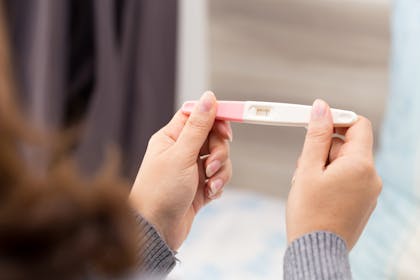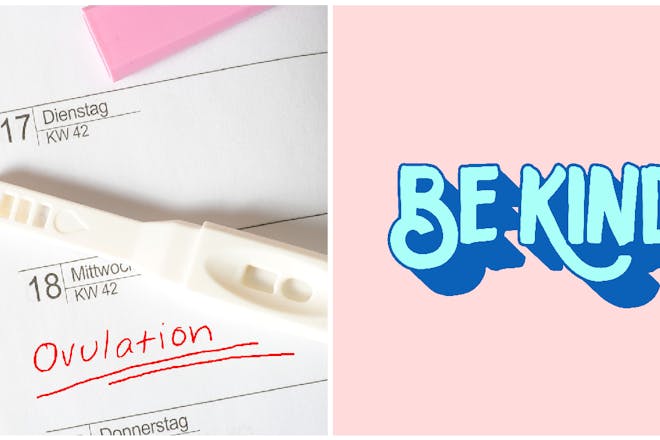Can you get pregnant during perimenopause?

If you're approaching the menopause, or are experiencing perimenopause, you probably have a lot of questions, including whether or not you can get pregnant. Here's what you need to know about getting pregnant during perimenopause.
This page contains affiliate links, which means we may earn a small amount of money if a reader clicks through and makes a purchase. All our articles and reviews are written independently by the Netmums editorial team.
Menopause and perimenopause can be difficult to navigate, especially if you still have hopes of getting pregnant.
To find out more about what perimenopause is, the symptoms, and whether you can pregnant during perimenopause, read on below.
Can you get pregnant during perimenopause?
It is still possible to get pregnant during perimenopause, according to the NHS.
FREE NEWBORN NAPPIES
This is because you still have periods during perimenopause, though they may become irregular, so there is still the possibility of an egg being fertilised.
During perimenopause (the transition stage before menopause), your periods may become irregular and unpredictable. If you haven't had a period for months, you may think you can't get pregnant, but your period could still come back, meaning you could still get pregnant.
So, if you're going through perimenopause and you don't want to get pregnant, make sure you're still using contraception.
Technically, the official medical definition of menopause is when you haven't had a period for at least a year. Before this, during perimenopause, you're still having periods but they may be irregular or unpredictable.

However, while it's still possible, your chances of getting pregnant during perimenopause are lower than they were when you were younger.
What is perimenopause?
Perimenopause is essentially the transition period your body goes through before the menopause.
You'll usually experience menopause symptoms for a few months or years before your periods actually stop: this is known as the perimenopause.
Perimenopause happens as your ovaries gradually start producing less oestrogen, and it lasts up until after your ovaries have stopped releasing eggs and you have your last period. Following this, the official medical definition of the menopause is when you haven't had a period for at least a year.
However, 'menopause' is often used as a catch-all term to encompass the symptoms of both menopause and perimenopause, as they're essentially the same.
Perimenopause usually begins in your 40s and lasts for an average of four to seven years, according to the NHS. However, some people start earlier and the length of time they experience perimenopause for can vary.
Menopause usually happens between the ages of 45 and 55, but around one in 100 women experience the menopause before 40.
Remember though: every woman's experience of perimenopause and menopause will be different, and the levels of symptoms people experience will be different too.
Once it's been a year since your last period, you've officially gone through the menopause and it's very unlikely that you'll become pregnant. Still, most experts recommend that you keep using contraception for at least two years after your last period, to be on the safe side. Even after that, it's still always a good idea to use condoms to protect against STIs when having sex with a new partner.
Symptoms of perimenopause
Perimenopause symptoms are generally the same as menopause symptoms, and it's common to experience symptoms for some time both before and after your periods stop.
According to the NHS, the most common symptoms are:
- hot flushes
- night sweats
- difficulty sleeping
- reduced sex drive
- problems memory and concentration
- vaginal dryness, and pain, itching or discomfort during sex
- headaches
- mood changes, including low mood and anxiety
- heart palpitations
- aching or stiff joints, or joint pains
- reduced muscle mass
- recurring UTIs (urinary tract infections)
Fertility during perimenopause
As we've explained above, it is still possible to get pregnant during perimenopause, as you're still having periods (even thought they may be irregular or unpredictable).
However, your fertility declines with age, so your chances of getting pregnant during perimenopause are lower than they are when you're younger.
The age that different women go through perimenopause varies, though it usually begins in your 40s, with menopause happening between the ages of 45 and 55.
So, taking women aged 45 and over as an example, according to the National Institute for Health and Care Excellence (NICE), women aged 45 and over have a less than 5% chance of getting pregnant naturally within a year of trying.
The chances are slightly better using assisted contraception techniques such as IVF, with just over 5% of embryo transfers leading to live births among 45-year-old women.
In the UK specifically, the Office for National Statistics (ONS) reveals that, in 2019, there were 1,454 babies born to women 45 and over in England and Wales (less than 0.5% of all births).
However, in your early 40s, it's likely your chances of becoming pregnant will be higher – and the age that everyone starts perimenopause will be different.
Want a complete guide on all things to do with the menopause? This book by Annice Mukherjee will be your ultimate toolkit to take control, rebalance your body and successfully maintain optimum health through and beyond menopause. It combines medical expertise and personal experience and it's available here at Amazon.
Looking for more information on getting pregnant? Read our articles below or share advice with others in the forum.
Related stories
Ovulation calculator and fertility calendar: find your best days to conceive


